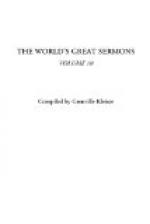chapters of this wonderful book. The homeward
march of the Persian army was a kind of triumphal
procession in which the Hebrew princes and leaders
walked as captives. The king marched in the guise
of a slave, with his eyes put out, followed by sullen
princes, with bound hands, and unsubdued hearts.
As slaves the Hebrews crossed the Euphrates at the
very point where Xenophon crossed with his immortal
ten thousand. In the land of bondage the exiles
were planted, not in military prisons, but in gangs,
working now in the fields, now in the streets of the
city, and always under the scourge of soldiers.
When thirty years had passed the forty thousand captives
were scattered among the people, one brother in the
palace, and another a slave in the fields. Soon
their religion became only a memory, their language
was all but forgotten, their old customs and manner
of life were utterly gone. But God raised up
two gifted souls for just such an emergency as this.
One youth, through sheer force of genius, climbed
to the position of prime minister, while a young girl
through her loveliness came to the king’s palace.
One day an emancipation proclamation went forth, from
a king who had come to believe in the unseen God who
loved justice, and would overwhelm oppression and
wrong. The good news went forth on wings of the
wind. Making ready for their return to their
homeland, all the captives gathered on the outskirts
of the desert. It was a piteous spectacle.
The people were broken in health, their beauty marred,
their weapon a staff, their garments the leather coat,
their provisions pieces of moldy bread, and their
path fifteen hundred miles of sands, across the desert.
To such an end had come a disobedient and sinful generation!
In that hour, beholding these exiles and captives,
a flood of emotions rushed over the poet; he saw those
bound who should conquer; he saw that men were slaves
who should be kings. Then, with a rush, an immeasurable
longing shivers through him like a trumpet call.
Oh, to save them! To perish for their saving!
To die for their life, to be offered for them all!
In an abandon of grief and sympathy, he began to speak
to them in words of comfort and hope. At first
these exiles, dumb with pain and grief, listened,
but listened with no light quivering in the eye, and
no hope flitting like sunshine across the face.
Their yesterdays held bondage, blows and degradation;
their tomorrow held only the desert and the return
to a ruined land. Then the word of the Lord came
upon the poet. What if the night winds did go
mourning through the deserted streets of their capital!
What if their language had decayed and their institutions
had perished? What if the farmer’s field
was only a waste of thorns and thickets, and the towns
become heaps and ruins! What if the king of Babylon
and his army has trampled them under foot, as slaves
trample the shellfish, crushing out the purple dye
that lends rich color to a royal robe? “Comfort




